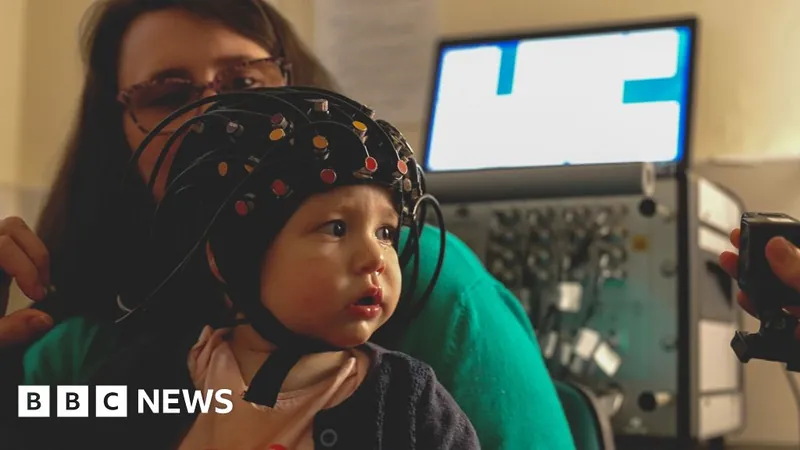
Unlocking the Secrets of Toddler Brains: A Groundbreaking Study
2025-04-10
Author: Lok
What Happens Inside a Toddler's Brain?
Ever wondered what’s buzzing in a toddler's mind? A groundbreaking research initiative is on a mission to find out!
Inside the Experiment: Meet Henry
Two-year-old Henry is fixated on the iPad before him. With each appearance of a smiley face, he eagerly taps the screen, triggering a delightful cartoon of a dancing animal. But this isn’t just a game; it's a sophisticated test of Henry’s developing decision-making skills.
Wearing a sensor-laden cap connected to intricate analytical equipment, Henry's brain activity is being scanned, providing invaluable insights into his capacity for inhibitory control—one of several crucial skills researchers at the University of Bristol are examining. These skills are essential for a child’s focus and learning capabilities.
A Unique Study with a Lifetime of Data
This remarkable initiative tracks the development of hundreds of children aged six months to five years, aiming to pinpoint when key cognitive skills emerge. What truly sets this project apart is its connection to the 'Children of the 90s' study, which has closely monitored the health of 300 mothers since they were infants themselves in the 1990s.
"We’re gathering a lifetime of data that connects the brain development of these children to the health and experiences of their parents," explains lead researcher Dr. Karla Holmboe. This unique approach enables researchers to draw correlations between generations, providing insights into early childhood development like never before.
Why Early Development Matters
Understanding when specific skills develop is crucial, especially since children who struggle early on often continue to face challenges later in life. "Intervention during these formative years can lead to more effective support, helping children thrive at a much younger age," Dr. Holmboe emphasizes.
Games that Matter: Henry's Challenge
As Henry engages with the smiley face game, the experiment tests whether he can resist the urge to tap on the familiar right side of the screen as the face occasionally pops up on the left instead. This moment of choice is vital; it mirrors the focus required when children enter the school environment—an ability to adapt and concentrate amidst distractions.
More Than Just Fun and Games: Jackson's Memory Test
Meanwhile, two-year-old Jackson is playing a game that sharpens his working memory. After observing a research assistant place stickers in various pots, he’s challenged to remember where the stickers are hidden—an engaging task that promises rewards. Dr. Holmboe notes, "Working memory is critical for problem-solving in daily tasks and learning, whether it’s math or reading. These foundational abilities are the building blocks of future academic achievements."
Long-Term Insight into Child Development
The new study extends the legacy of the 35-year-old Children of the 90s project, which has unearthed vital insights into various topics, from obesity to autism and mental health impacts during the pandemic. The extensive data collected has become a treasure trove for researchers worldwide, appearing in thousands of scientific articles.
Remarkably, recent findings showed that children lacking sufficient omega-3s in their diets exhibited less sociability and kindness—further proving the intricate connection between health and development.
Looking Ahead: The Future of Childhood Studies
This new study, focused on the brain development of the children of the children of the 90s, will continue to follow these young participants until they embark on their educational journeys. The results promise to reshape our understanding of early childhood development and provide crucial insights that could enhance educational methods for generations to come.





 Brasil (PT)
Brasil (PT)
 Canada (EN)
Canada (EN)
 Chile (ES)
Chile (ES)
 Česko (CS)
Česko (CS)
 대한민국 (KO)
대한민국 (KO)
 España (ES)
España (ES)
 France (FR)
France (FR)
 Hong Kong (EN)
Hong Kong (EN)
 Italia (IT)
Italia (IT)
 日本 (JA)
日本 (JA)
 Magyarország (HU)
Magyarország (HU)
 Norge (NO)
Norge (NO)
 Polska (PL)
Polska (PL)
 Schweiz (DE)
Schweiz (DE)
 Singapore (EN)
Singapore (EN)
 Sverige (SV)
Sverige (SV)
 Suomi (FI)
Suomi (FI)
 Türkiye (TR)
Türkiye (TR)
 الإمارات العربية المتحدة (AR)
الإمارات العربية المتحدة (AR)